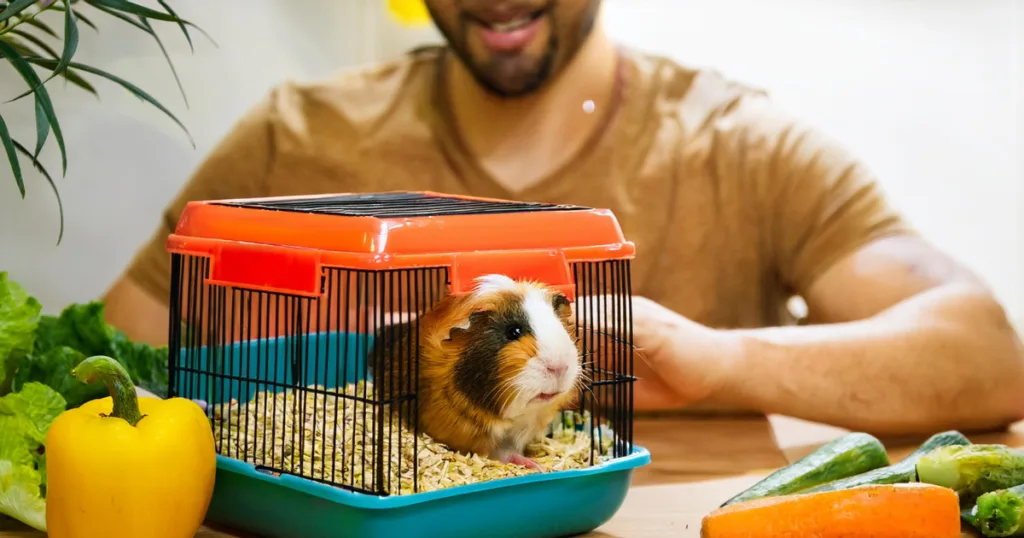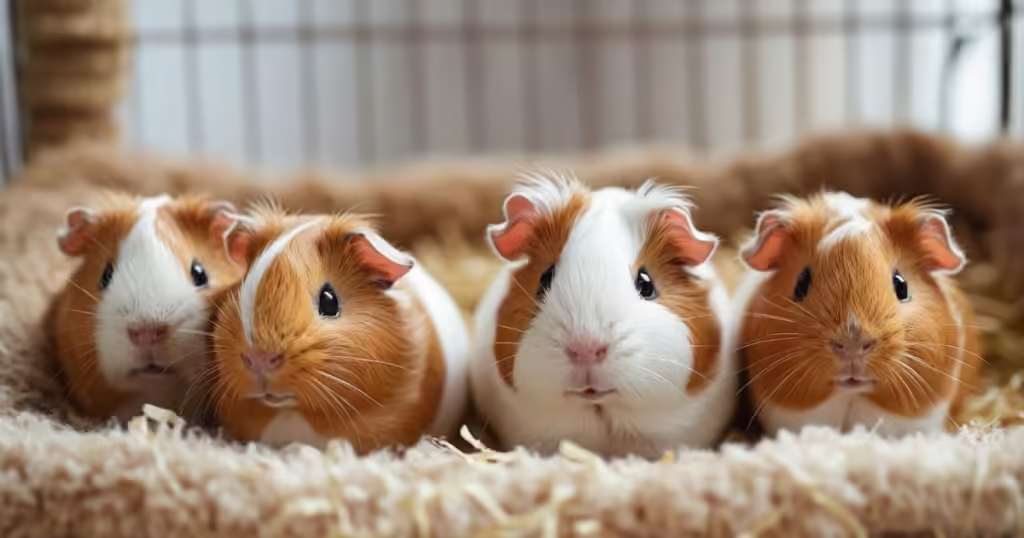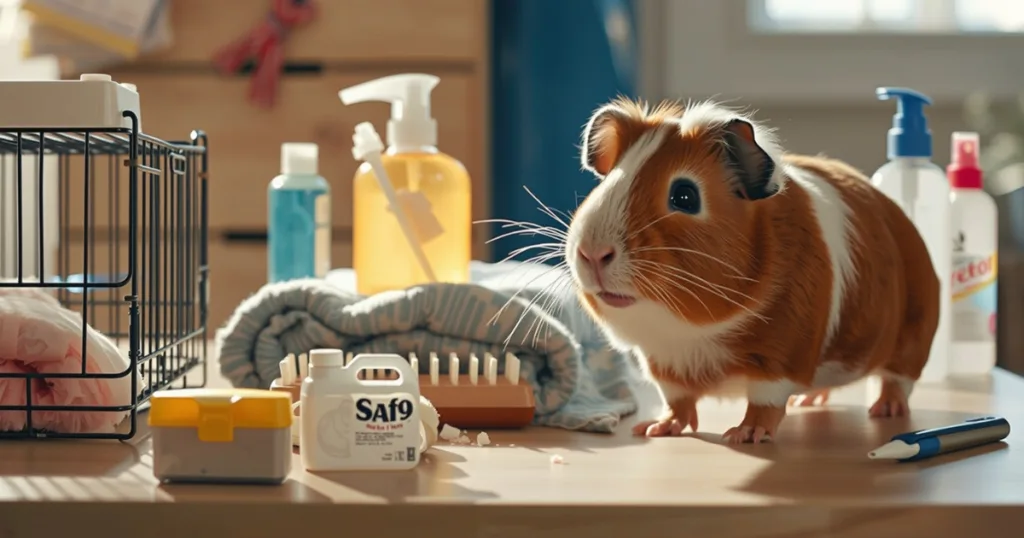Introduction
Welcoming a guinea pig into your family is an exciting journey! These gentle animals thrive with proper care and attention. In this Guinea Pig Care Guide for Beginners, we will cover essential topics to help you ensure a happy and healthy life for your new pet. Understanding their needs, environment, and health care is crucial for any guinea pig owner, especially beginners. With the right knowledge and preparation, you can create a loving home for your furry friend.
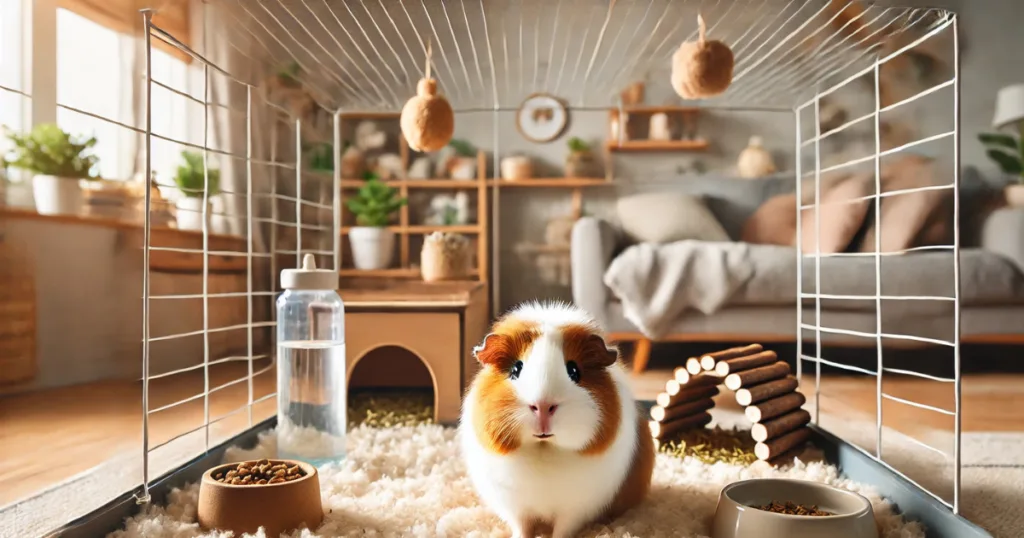
Understanding Guinea Pigs
What Are Guinea Pigs?
Guinea pigs, or cavies, are social rodents known for their friendly demeanor. They originate from the Andes mountains of South America and have been domesticated for centuries. According to the Guinea Pig Society, they enjoy living in groups, making companionship crucial for their happiness.
- Social Creatures: They thrive on social interaction, both with other guinea pigs and their human caretakers. Having at least two guinea pigs is recommended to prevent loneliness, as they are herd animals by nature.
- Communication: Guinea pigs communicate through various sounds, including chirps, wheeks, and purrs. Each sound has a different meaning, from excitement to contentment. Understanding these vocalizations can enhance your bond with your pet.
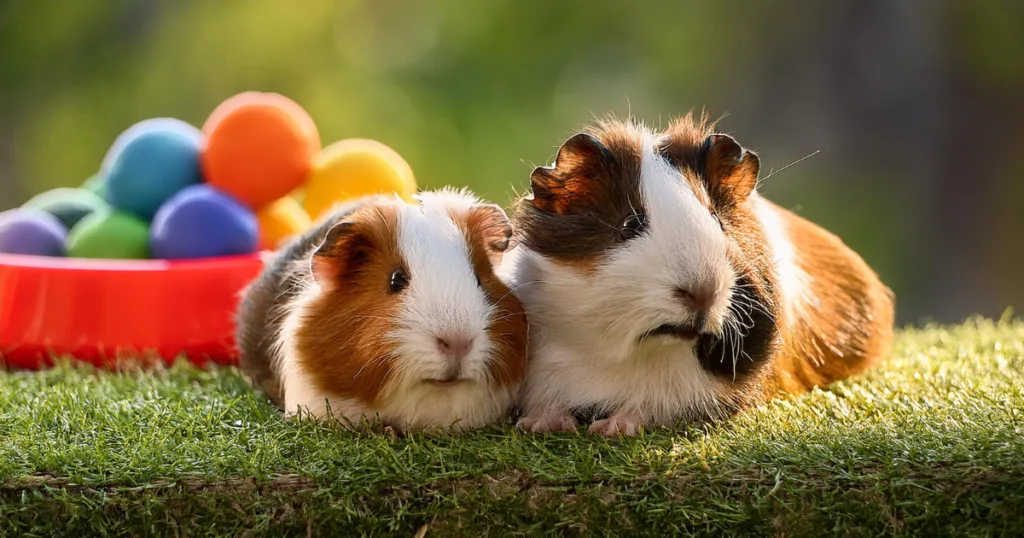
Lifespan and Growth Stages
Understanding your guinea pig’s lifespan and development stages is vital for effective care. They typically live 4 to 6 years, with proper care extending their lifespan.
- Babies (0-3 months): During this stage, they require extra care and socialization. Handling them gently can help them become accustomed to human interaction.
- Young Adults (3-6 months): This period is marked by increased curiosity and activity. They are learning their social behaviors, which is essential for their development.
- Adults (6 months and older): Adult guinea pigs require a stable environment and consistent care routines to thrive.
Setting Up Your Guinea Pig’s Home
Choosing the Right Cage
A spacious, comfortable cage is crucial for your guinea pig’s well-being. Experts recommend a minimum size of 7.5 square feet for one guinea pig and 10.5 square feet for pairs, according to the ASPCA.
- Multi-Level Cages: Consider getting a multi-level cage to provide more space for climbing and exploring. These designs can help keep your guinea pig active and engaged.
- Cage Accessories: Equip the cage with tunnels, hideaways, and chew toys to create an enriching environment. Providing different textures and spaces keeps their mind stimulated.
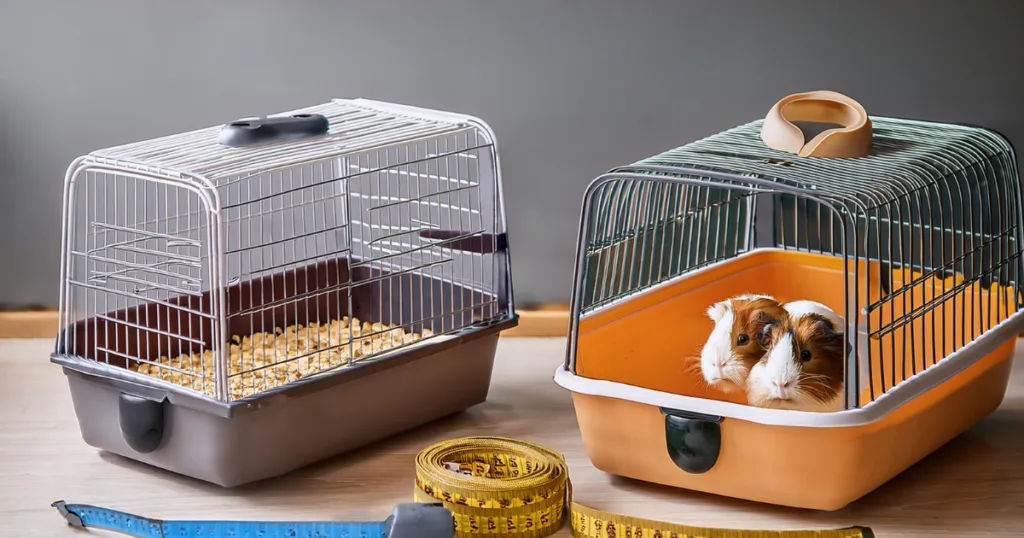
Bedding Choices
Selecting the right bedding is key to your guinea pig’s comfort and health. Aspen shavings and paper-based bedding are safe options that help manage moisture.
- Avoid Cedar and Pine: These types of bedding can produce harmful oils that irritate a guinea pig’s respiratory system. Stick to safe alternatives for a healthier living environment.
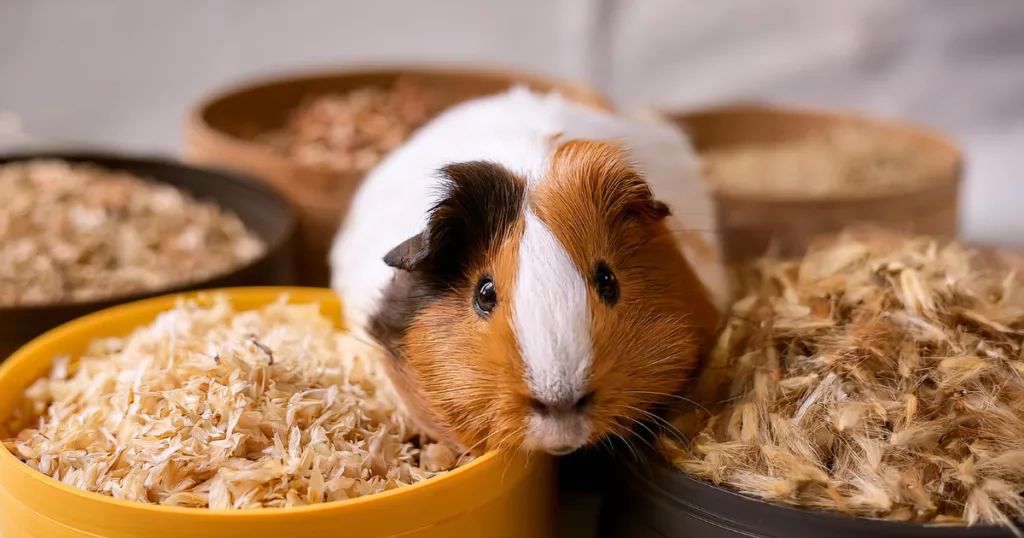
Cage Location
Place the cage in a quiet, temperature-controlled area to provide a safe environment. Avoid direct sunlight and drafts.
- Avoid High Traffic Areas: Placing the cage in a quiet room reduces stress and allows your guinea pig to feel secure in their environment.
Feeding Your Guinea Pig
Essential Diet
A balanced diet is essential for your guinea pig’s health. High-quality hay, pellets, and fresh vegetables should be the staples of their diet.
- Hay: Timothy hay should make up about 80% of their diet. It provides essential fiber, which aids digestion and keeps their teeth healthy.
- Pellets: Choose pellets specifically formulated for guinea pigs. Look for brands that are high in fiber and free from seeds, which can lead to obesity.
- Fresh Vegetables: Offer a variety of vegetables daily, including bell peppers, carrots, and leafy greens. This not only provides necessary nutrients but also keeps mealtime interesting for your pet.
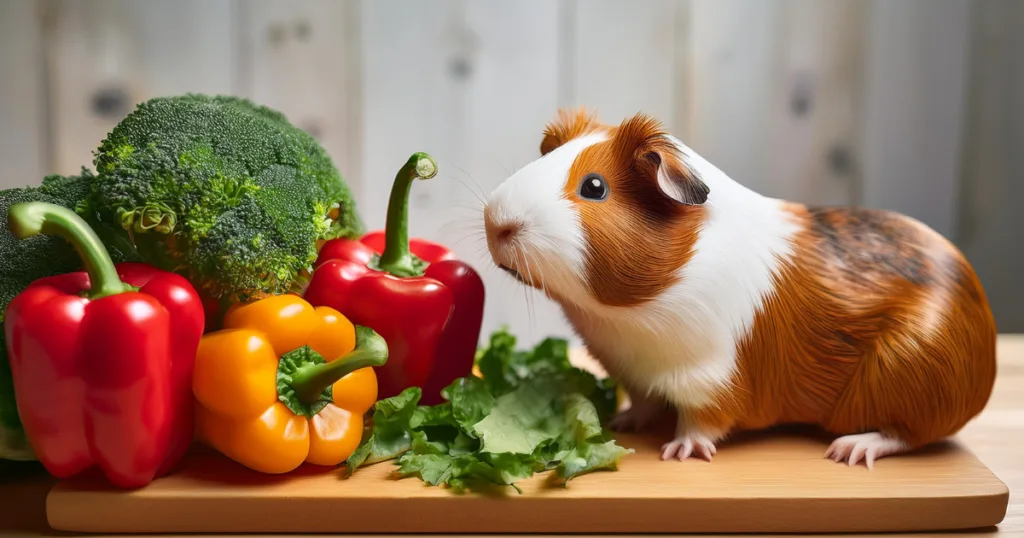
Importance of Vitamin C
Since guinea pigs cannot produce vitamin C, it’s crucial to provide foods rich in this nutrient. Bell peppers and leafy greens are excellent sources.
- Vitamin C Supplements: If you’re unsure whether your guinea pig is getting enough vitamin C from their diet, consider adding supplements specifically designed for guinea pigs.
Daily Care
Cleaning the Cage
Regular cleaning of the cage is necessary to maintain hygiene. Remove waste and uneaten food daily, and conduct a thorough cleaning weekly.
- Routine Maintenance: Keeping the environment clean helps prevent illnesses and promotes good hygiene.
- Deep Cleaning: Once a week, replace all bedding and clean the cage surfaces with safe, non-toxic cleaners to keep harmful bacteria at bay.
Handling and Playing
Building trust through gentle handling is important. Spend time interacting with your guinea pig daily to promote a strong bond.
- Gentle Approach: Always approach your guinea pig calmly. Scoop them up with both hands and support their body to make them feel safe.
- Playtime: Allow your guinea pig to explore outside of their cage in a safe, enclosed area. Supervised playtime is essential for their mental stimulation and physical health.

Health Care
Signs of Illness
Be observant of any changes in behavior, appetite, or activity levels. Common signs of illness include sneezing, lethargy, or dental issues.
- Behavioral Changes: Sudden changes in behavior, such as hiding more than usual or a lack of interest in food, can indicate health problems.
- Physical Symptoms: Regularly check your guinea pig’s teeth and gums for signs of overgrowth or decay, as dental issues are common in guinea pigs.
Veterinary Visits
Schedule regular veterinary check-ups to monitor your guinea pig’s health. Early detection of health issues is crucial for effective treatment.
- Find a Vet Experienced with Guinea Pigs: Not all veterinarians are familiar with guinea pig care. Look for a vet who specializes in exotic animals to ensure your pet receives the best care.

Frequently Asked Questions
- What size cage do I need for one guinea pig?
- A minimum of 7.5 square feet is recommended for one guinea pig, with more space preferred for additional pets.
- How often should I clean my guinea pig’s cage?
- Perform daily cleaning and a thorough clean at least once a week.
- What vegetables can I give my guinea pig?
- Safe options include bell peppers, leafy greens like kale and romaine, and carrots.
- How do I know if my guinea pig is sick?
- Watch for signs such as weight loss, unusual behavior, and changes in appetite.
- Can guinea pigs be litter trained?
- Yes, with time and patience, they can learn to use a designated area in their cage for bathroom needs.
Conclusion
Caring for a guinea pig can be incredibly rewarding. This Guinea Pig Care Guide for Beginners offers valuable insights to help you nurture a happy, healthy pet. By following these guidelines and ensuring your guinea pig receives proper care, you’ll enjoy a wonderful companionship for years to come!
In summary, understanding your guinea pig’s needs—from diet to habitat and health care—is crucial for a fulfilling relationship. The love and attention you provide will lead to a happy, thriving guinea pig, enriching both your lives.

